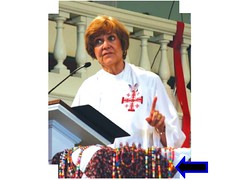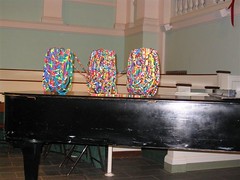Colossians 3:12-17It was the middle of winter. The church was cold – the fact that the trustees could not decide on a setting for the thermostat was evident in the number of women who refused to remove their coats and gloves in the sanctuary. The people were still arriving, stomping the snow off their shoes at the door, creating little puddles of water. No one bothered to remove his cold attitude, however, and the people in the room weren’t providing any warmth to chase away the chill of the Sunday morning.
Announcements were shared. The speaker didn’t bother to ask the congregation to “greet each other in Christian love.” The walls between these people were too high and too thick to be breached with a handshake. The choir had long since disbanded over arguments about the style of music it should sing. The organist, who had been playing at the church for as long as anyone could remember, played the anthem by herself. No one really listened to it, because they had all heard it before. They didn’t sing hymns anymore; there was no choir to lead them, and no one really felt the joy of any “Amazing Grace.”
Finally the time for the sermon arrived. The minister, who had been newly appointed the previous week, stood at the pulpit and surveyed the flock whose care had been entrusted to her. Her hands were shaking, and she wondered if her voice would fail her. In the three days she had been living in the parsonage, she had received not less that six phone calls warning her to avoid the mistakes of the previous pastor. No one really agreed what those mistakes had been, but everyone was sure that all of the problems they now faced were because of him. No one was particularly confident that she would be able to make a difference, but each of them wanted to make sure that the new preacher understood “how things were.”
She gripped the edge of the pulpit, taking a moment to gather her thoughts. She was not at all reassured by the grim stares of those who sat in front of her, waiting for her to fall off of the tight-rope she was walking. Reaching for her bible, she said, “Today’s lectionary reading is from Isaiah 55.” She reached verse 12, and said, “You will go out in joy and be led forth in peace; the mountains and hills will burst into song before you, and all the trees of the field will clap their hands.”
Someone near the middle of the room slammed a hymnal down on the pew. On the side of the room, someone else laughed – not a laugh of amusement, but one of snide contempt. An indrawn breath was the last sound to be heard before the room fell to complete silence – as heavy as the humidity on a mid-August day, but with none of the warmth.
In the quiet, the door burst open, and light from the mid-winter sun filled the room. Everyone turned to see who would dare come into church late. They watched as a man began to walk down the aisle. He had dark hair, a little long, with a tiny amount of gray at the temples. The gray spoke of years of experience, but did nothing to dim the vibrant and passionate life which seemed to vibrate from him. His eyes were as blue as the hair of one of the youth who sat in the balcony – an unnatural color – and they seemed to spark. Laugh lines radiated from his eyes, but right now, he wasn’t laughing. He wore a simple outfit of slacks and a golf shirt, covered by a worn but comfortable-looking brown cardigan. The only odd thing about his appearance was that he wasn’t wearing any shoes, which caused many of those present to frown.
He continued to walk up the aisle, not stopping to sit in a pew. One very brave little boy escaped his mother’s restraining hand to dart out into the aisle, stopping the stranger. The man bent down and smiled at the boy, the wrinkles in his face becoming more pronounced. The boy said, “Why aren’t you wearing any shoes?”
The man replied, “I haven’t found any that don’t hurt my feet. No one can seem to make a pair that I can’t overfill.”
“My shoes hurt my feet, too, but Mom says I have to wear them.”
He smiled again, and said, “Moms can be particular about things like that.” He ran his hand over the little boy’s red hair, and then continued up the aisle, toward the altar. No one tried to stop him; they were all amazed that this man had the effrontery to come into their church.
He smiled at the minister, who smiled back, and then he turned to speak to the church. Unrest was starting to travel across the crowd, but everything hushed when the man’s voice was heard. The man was a stranger to them -- they hadn’t heard his voice before. Even so, they immediately recognized it.
“I have chosen you. You are a holy and beloved people, and yet you are disappointing me.”
No one moved. No one spoke a word or even blinked an eye.
“I have given you many gifts, including a wardrobe that would please me. I picked it out for you – each piece perfect in its structure and appearance. You are to clothe yourselves in compassion and kindness, and yet you don’t even seem to know the meaning of the words. The grace of humility and the soft touch of gentleness are foreign to you.” He laughed, not the laugh he had shared with the little boy, but one of disbelief. “Patience? Not to be found here. I love you, and I have created you to love each other. None of you is perfect.” He stopped, and glared at them, his blue eyes intense with meaning. “I am telling you to bear with each other, and to forgive each other’s mistakes. Whatever the grievances are, none of them are more important than the love you are to show to each other.” He stopped for a moment, seeming to want to add emphasis to his next words. “I have forgiven you. I forgive you everyday. Forgive each other.”
He turned toward the minister, and walked across the front to the church to reach the pulpit. Stopping for a moment, he took off the sweater, and said, “Over all of this, put on the gift of love, which binds everything else together.” Saying this, he laid the sweater across her shoulders. Wrapped in the warmth left in the garment by the love of God, she started to cry, finally able to escape the cold.
Turning back to the congregation, he found them no longer frozen, but instead holding each other, some with tears, and some with smiles – all sharing warmth. “I sent my son to teach you about me. He came so that you would know peace, and so that it would rule your heart. Remember that you are all part of one body – you are all part of me. Be thankful. Remember what my son taught you, teach each other of his words, and care for each other. Let gratitude overflow from your hearts and worship – sing songs which echo from the spirit I have left with you. Sing with gratitude and joy; your efforts will be pleasing to me, and you will know I am with you, smiling.
“Whatever you do, do it in the name of my son. Remember that you are beloved, and remember to love each other.”
God blew the warm air of his breath across the room, chasing away any remaining chill. He walked back down the aisle and left, but all those who remained knew that he would be back, and that he would be welcomed into His church.






























